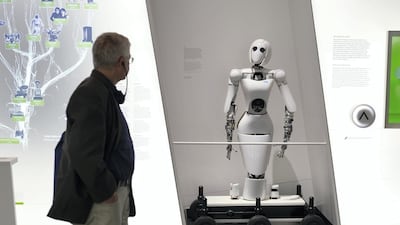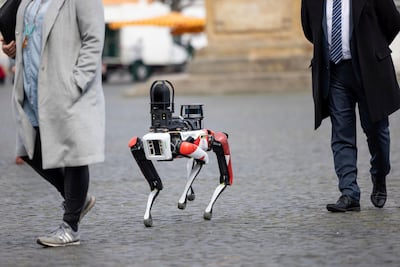Europe’s new plan to regulate artificial intelligence and ban nightmarish technology such as toys that manipulate children is likely to have a positive global impact, an expert said.
Professor Barry O’Sullivan, an AI expert at University College Cork, said the planned EU law could protect citizens and democracies from the unintended consequences of new technology.
Few would have imagined how social media has developed over the years, he said, with EU leaders - who have fought a range of battles with tech giants such as Facebook and Google - determined not to be left behind again.
Brussels unveiled the AI proposal on Wednesday, with technologies grouped into tiers according to how much of a risk to society they could pose.
Government “social scoring” systems and manipulative toys that use voice assistance to encourage dangerous behaviour are in the tier named “unacceptable risk” and will be banned.
“High-risk” systems such as CV-sorting software and systems that check travel documents will be subject to close regulation.
Some civil liberties groups warned that the proposal contained loopholes which governments could use to impose unwanted technology.
Exceptions set out under the draft law would allow mass recognition technology in cases such as a police manhunt or a search for a missing child.
Google and other tech firms are taking the strategy seriously because Europe often sets a standard on how tech is regulated around the world.
Prof O'Sullivan, the former vice chair of a high-level expert group on AI appointed by the European Commission, told The National that the proposal was likely to have a "massive impact" and become a world leader in the field.
“The problem with really fast-moving technologies is that there are lots of unintended consequences,” he said.
“Obviously social media is a phenomenon that, 10-15 years ago, I don’t think we would have imagined the impact that it’s had today.
“We’ve seen lots of examples where AI technology has been used in the context of social media, where lots of personal data has been used to feed some of the AI technologies that have been produced, where there has been considerable public alarm.
“It is correct that the Commission should, as a consequence, take a view that these technologies are potentially harmful if used incorrectly, or used inappropriately.”
EU seeks to promote AI industry within its borders
The plan was unveiled by the European Commission on Wednesday and will need to be agreed by member states and MEPs before it takes effect.
Brussels says it is not aiming to stifle the AI industry, but wants to promote innovation by increasing trust in the technology.
The EU has few competitors to the giants of Silicon Valley and their Chinese counterparts.
Google warned last year that the EU’s definition of artificial intelligence was too broad and risked over-regulating the technology.
Tech lobbyist Christian Borggreen from the Computer and Communications Industry Association called for the proposal to be further clarified to “avoid unnecessary red tape”.
Technologies on the high-risk list will need to meet an array of requirements including risk assessments and human oversight before they can go to market.
However, the watchdog Algorithm Watch warned that these requirements were “mainly based on self-assessment”.
Lower-risk technologies include AI chatbots on websites, which will merely have to identify themselves as non-human.
The proposal foresees heavy fines for companies which flout the regulations.
Thierry Breton, the EU’s internal market commissioner, said the proposals “aim to strengthen Europe’s position as a global hub of excellence in AI”.
Consumers might feel more comfortable using AI technology if they know that it is safe, Prof O’Sullivan said.
“Generally these types of technologies have massive positive consequences and positive uses,” he said.
“But for those cases where issues arise, then it’s appropriate to have some sort of regulatory instrument to make sure that citizens are protected, that businesses are protected, that democracies are protected.
“I think it is going be something that will have world-reaching impact, and I think it will become a world-leading piece of legislation.”



